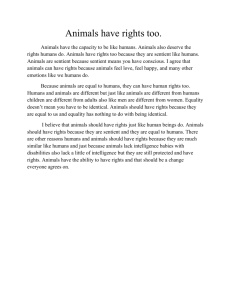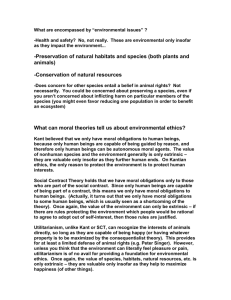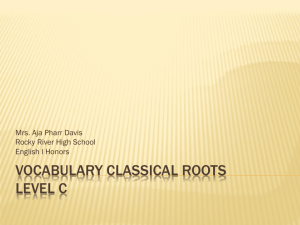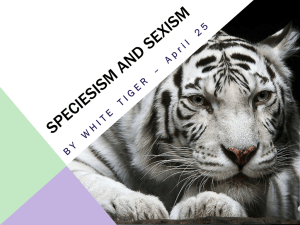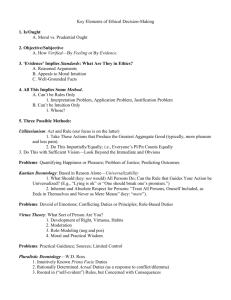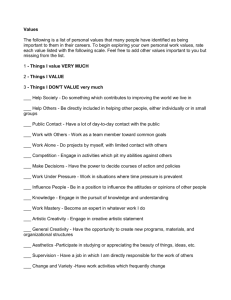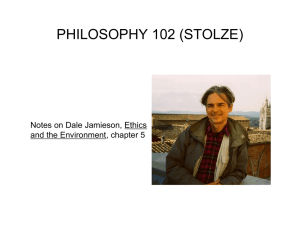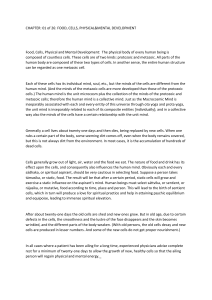Animal Spectrum - Animal Liberation Front
advertisement
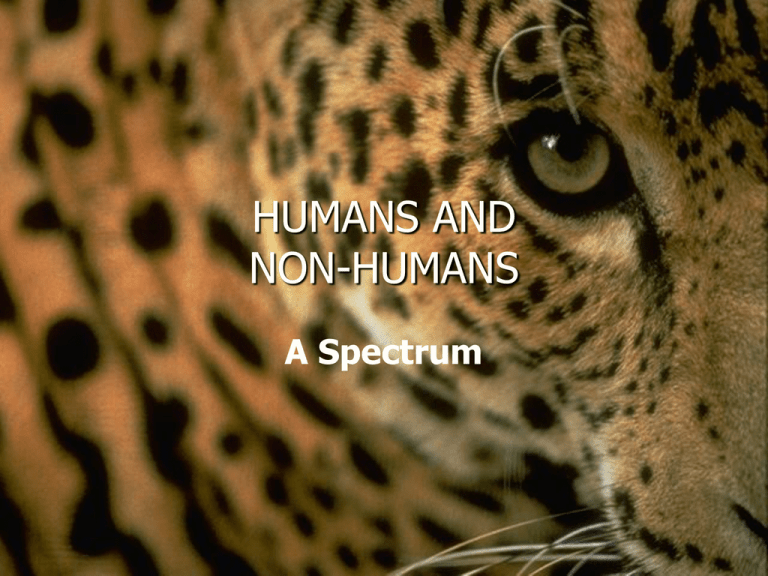
HUMANS AND NON-HUMANS A Spectrum “Western” paradigm emphasizes gulf between humans and animals ■ Religious traditions: humans as “the crown of creation”, e.g. Judaism, Christianity, Islam. ■ Secular traditions: humans as unique autonomous, rational, moral. technological language users e.g. Aristotle, Kant. ■ “Evolutionary ethics”: humans as “the crown of evolution”, e.g. Huxley (but not Darwin!) Ecological perspective: fate of humans is bound up with fate of the rest of nature. ■ Midgley: natural human affinity towards other animals. ■ Norton: scientific perspective implies harmony with nature. ■ Traditional societies e.g. Maaori: all living things are related, as descendents of Tane. ■ Animal liberation: we have duties to all animals, and their interests are (nearly) always equal to those of Humans. (Singer) ■ Biocentric egalitarianism: we have duties to all living things. (Taylor) ■ Nonanthropocentric environmental ethics: we ought to pursue environmental justice because all species are equal. (Sterba) ■ We have duties to at least some “environmental objects” (Stone). ■ We have (largely unspecified) duties to “the land”. (Callicott, Leopold) ■ We have duties to inanimate objects e.g. buildings, works of art. Anthropocentrism ■ Concept All and only human beings have moral standing; or, the appropriate criterion of moral standing is membership in Homo sapiens. Applications ■ We have duties concerning animals (as we do concerning works of art or cars) but not to animals. ►We may treat animals as we wish, except where the interests of others are affected, eg dog owners, recreational hunters, bird watchers (Baxter) ► We ought not to mistreat animals because if we do we are likely to become the kind of person who mistreats humans (Aquinas, Kant). ■ “Weak anthropocentrism” - the human interest requires a respect for natural systems (Norton). ►Sustainability - obligations to future generations. ► Personal spiritual development - Buddhist monks, Jains, Ghandi. Sentience Based Ethics ■ Concept All and only sentient beings have moral standing. ►Sentience: ability to have sensations, to experience pleasure and pain. Key Philosophical Issues ■ What counts as having a sensation? ► How do we know that an animal is having a sensation? ► Is “sensation” talk just an inference from behaviour? ■ Can we talk about anything except behaviour? ►Is there anything except behaviour? Applications Descartes (and/or his followers): animals are non-sentient “machines” and so have no moral standing. ►Bentham, Singer: most animals are sentient, and it is wrong to cause them to suffer except where that would be the only way to create the best outcome. UTILITARIANISM Singer Utilitarianism requires that all interests (or preferences) be taken equally into account. ►“Speciesism” - ignoring the interests of a being just because it belongs to another species - is wrong, just like racism and sexism. ■ All sentient beings have an equal interest in avoiding suffering, e.g. farming of animals inflicts suffering – and also denies food to starving people. ►We do not need (e.g.) to eat animal products. ► So we ought (e.g.) to become vegetarians. ■ Similar argument against painful use of animals, e.g. ► research ► product testing ► sport and entertainment. ■ Is the analogy with racism and sexism valid? ■ Are the consequences the ONLY thing that matters, morally? ■ How do we know that animals suffer? ■ Isn't “sentientism” just as bad a form of discrimination as speciesism? Would PAINLESS farming and killing of animals be wrong? What difference will MY actions make to animals - or to starving people? Is “moral atomism” adequate to deal with environmental issues? Sentience Based Ethics ■ Concept: All and only beings with specific properties have moral standing. Applications Regan: subjects of a life. MA Warren, Tooley: self-concept. Huxley: language. RIGHTS Regan ■ All beings with certain properties are PERSONS, regardless of race, sex or species. ■ Many non-humans are persons e.g. gods, aliens (ET?), some animals - and e.g. irreversibly comatose humans are not. ■ All persons have inherent value and not mere instrumental value. ■ All inherently valuable beings have rights: ► independently of consequences ► regardless of how many people recognize their rights. ■ Rights may not be violated in order to bring about good consequences. ► (e.g.) Killing animals for food violates their rights. ■ So we ought (e.g.) to become vegetarians (etc.). SOME QUESTIONS FOR REGAN ■ Is the analogy with racism and sexism valid? ■ Isn't “personism” just as bad a form of discrimination as speciesism? ■ Why should we accept Regan's account of personhood? ■ How do we know that animals have the properties of persons? ■ Is “moral atomism” adequate to deal with environmental issues? RIGHTS FOR WHAT? Humans? Selected sentient beings? All sentient beings? All living beings? Individual natural objects? Places? Works of art? Corporations? Cultures, peoples, nations? Species? Planets? The universe? Everything?
